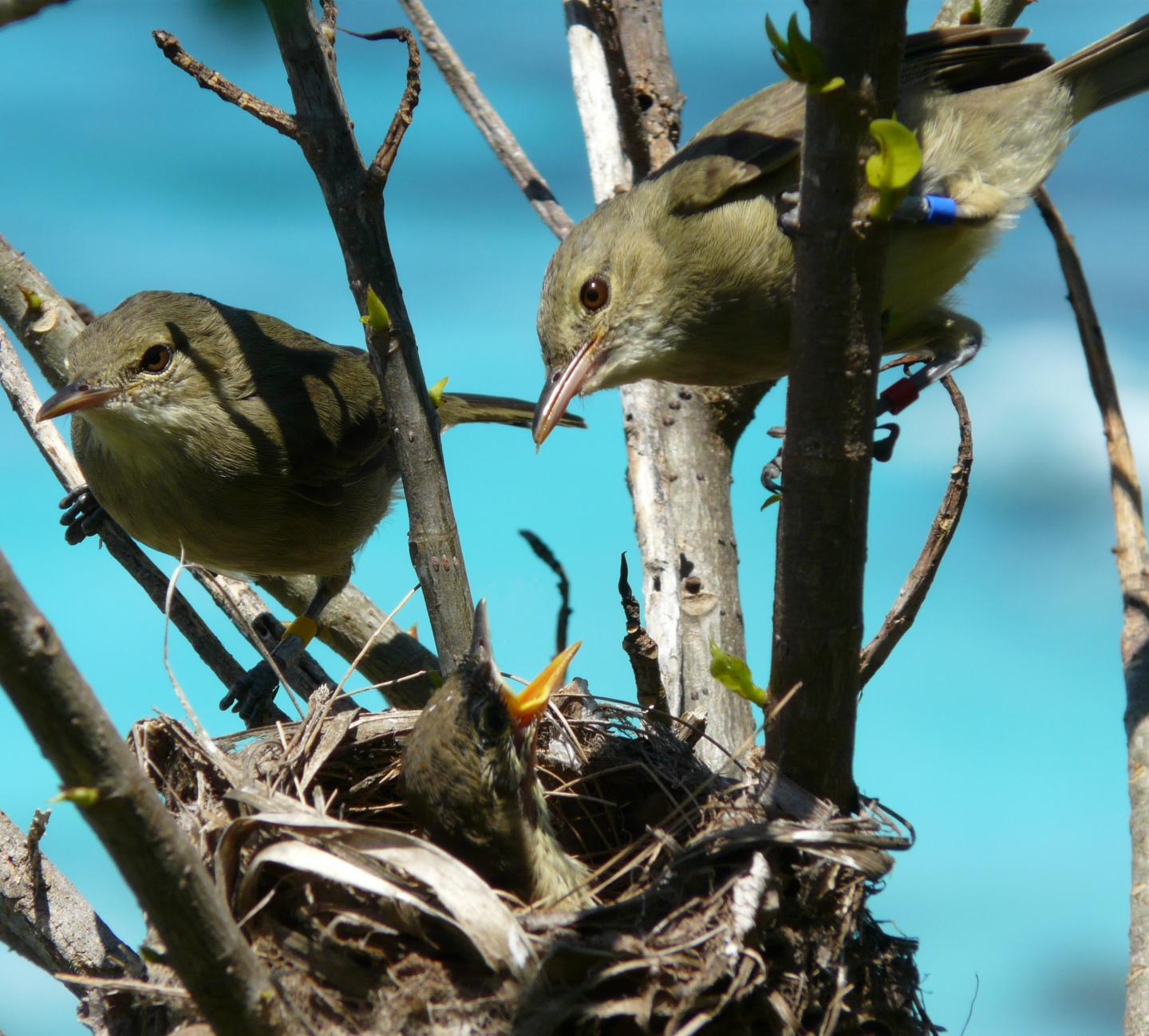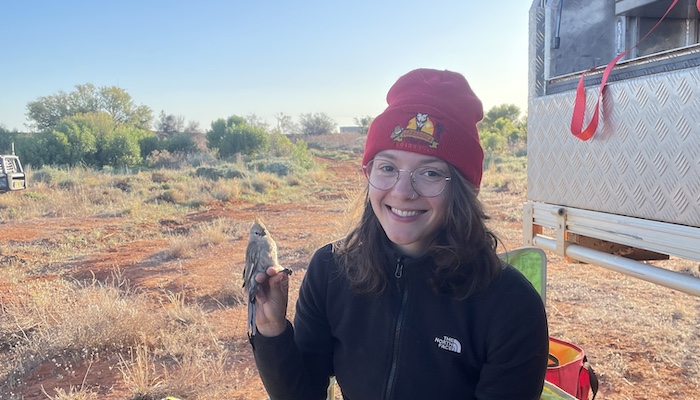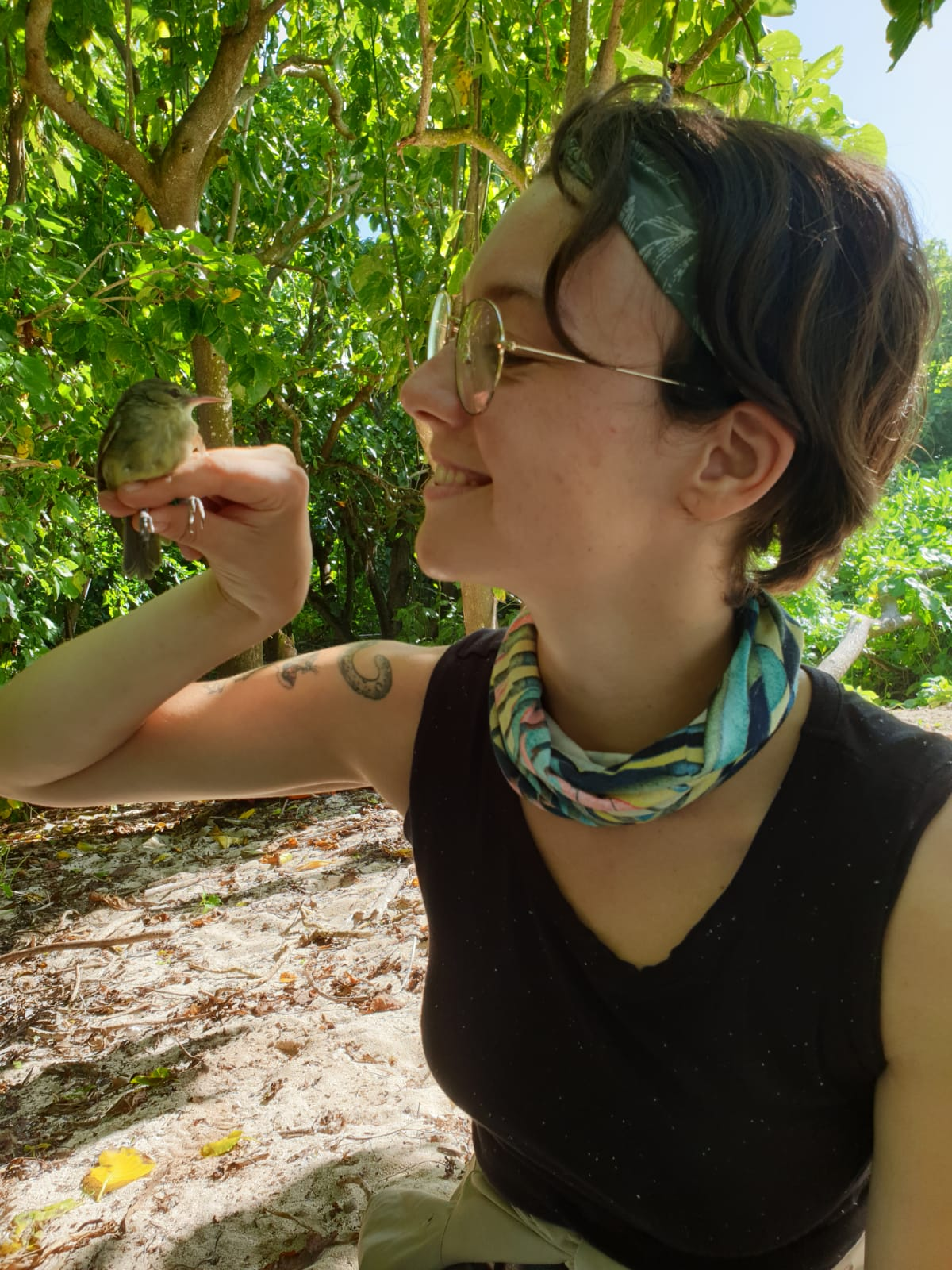A long-term study of the mating behavior of Seychelles warblers (Acrocephalus sechellensis) has provided some insight into the factors that influence whether bird couples stay together or part ways. The findings don’t always match those from other species, opening up opportunities to explore the reasons for the differences.
Raising young is hard, and many birds can only manage it in pairs that must last a whole breeding season. Like many birds, Seychelles warblers’ bonds are usually more long-lasting, with pairs sticking together one season after another. Yet exceptions can be revealing, leading Dr Frigg Speelman of Macquarie University to combine her own observations with a 24-year study of warblers on Cousin Island to find what predicts and follows warbler “divorces”. Remarkably, although there have been many previous studies of divorce among normally monogamous birds, this appears to be only the third to take a long-term view.
On the island, 14 percent of warbler partnerships end in divorce, Speelman and colleagues found, while 69 percent end in widowhood. In other cases, both birds may die at once, or an unsuccessful attempt by humans to relocate them to another island can sunder a happy marriage.
It makes sense that lack of breeding success would prompt avian divorce, indicating as it does either incompatibility or that at least one partner is somehow unfit. Curiously, Speelman and colleagues found that low numbers of eggs predict divorce, but not the number of young successfully raised to fledgling age. Speelman told IFLScience she can’t explain this. However, she said; “Studies of other species also find earlier measures [in the breeding cycle] are more indicative than later ones.”

A screaming baby may make some humans think about heading for the door, but among warblers, it’s the lack of eggs that makes divorce more likely.
Image Credit: Janske van de Crommenacker, courtesy of Frigg Speelman
Seychelles warbler couples are often mixed in age, and the researchers report divorce was equally likely throughout the female’s life. Divorce rates in males start high and drop in middle age, which is also the time when their breeding is most likely to be successful, before rising again as they get old.
We can’t survey birds about what makes them break up. Indeed, when asked if she could tell which partner initiated the divorce, Speelman told IFLScience; “I wish I could, it would make everything much easier.” However, Seychelles warblers give us a big clue. The population Speelman is studying doesn’t have enough territories with sufficient food to go around. Speelman and colleagues think the initiator is usually the one who keeps the territory, as only a deeply dissatisfied bird – or one very confident of finding a warm welcome elsewhere – would depart voluntarily.
On this basis, males and females appear to choose to dump their partner about equally, although quite how rights over territory are settled in the absence of divorce courts is unknown. Speelman told IFLScience she has never seen a divorcing couple fight over territory, but observations are not continuous enough to rule it out.
The warblers fiercely defend their territories, and those without their own space end up in subordinate roles, feeding others’ chicks. Young but sexually mature warblers will help their parents raise siblings, which makes sense in terms of gene preservation. However, Speelman added that some birds disperse to new territories and take on a subordinate role there, which is thought to serve as an apprenticeship, giving them experience that is useful when they do get to breed.
The consequence is that there is always a ready supply of potential mates for a divorcee (or widow) who keeps the territory. Speelman told IFLScience she has seen some birds with a new mate within hours of ditching the old one, the unfeeling bastards.

Dr Frigg Speelman with a Seychelles warbler that may or may not be considering divorcing its partner.
Image Courtesy of Frigg Speelman
The grass may always be greener on the other side, but Speelman found those presumed to have initiated the divorce did no better in subsequent breeding cycles than they had before, or those who were widowed. Some studies of other birds suggest leaving an established bond may come at an immediate cost, with unfamiliarity leading to breeding failure in the first year, followed by longer-term benefits, but there was no evidence for this here. That hot new trophy wife or husband doesn’t mean more children for a warbler.
For female warblers, when divorce means the loss of a breeding territory the consequences can be dire, with a substantially shortened life expectancy. The same isn’t true for widowed birds, perhaps because they usually hold onto their territory. However, the team acknowledges causality is unclear, writing in their paper that “Some males may divorce females in poor condition which—although not detected in our study prior to divorce—results in higher mortality of these divorced females.”
Divorced females that lose their territory but survive often end up as caring grandmas, helping their offspring raise young. Divorced males don’t seem to do better or worse than those of similar ages who stay together or are widowed.

Maybe the reason some Seychelles warblers divorce is because they’re looking for another bird that looks at them like Frigg Speelman does.
Image courtesy of Frigg Speelman
There’s an inevitable temptation to anthropomorphize animal behavior like this, but fun as it is, lessons should be drawn with care. Sociobiologists love finding an animal species whose behavior matches a pattern in humans they wish to call “natural”, and ignore countless other species that do things differently. The fact that the findings for the warblers often don’t match previous studies in seabirds emphasizes the risk of jumping to conclusions.
The study is published open access in the journal Ecology Letters.
Source Link: Why These Little Birds Divorce Despite The Risks